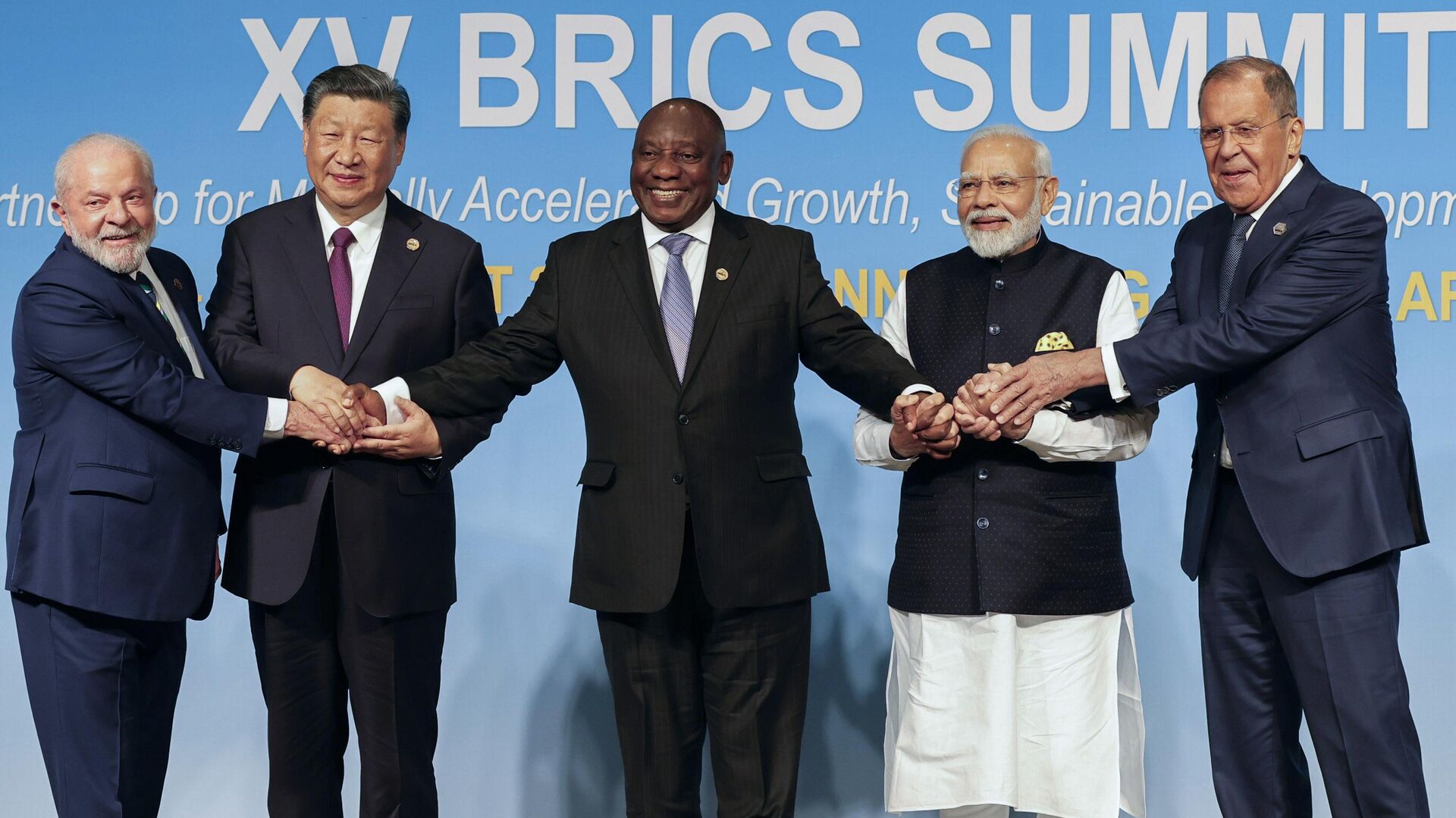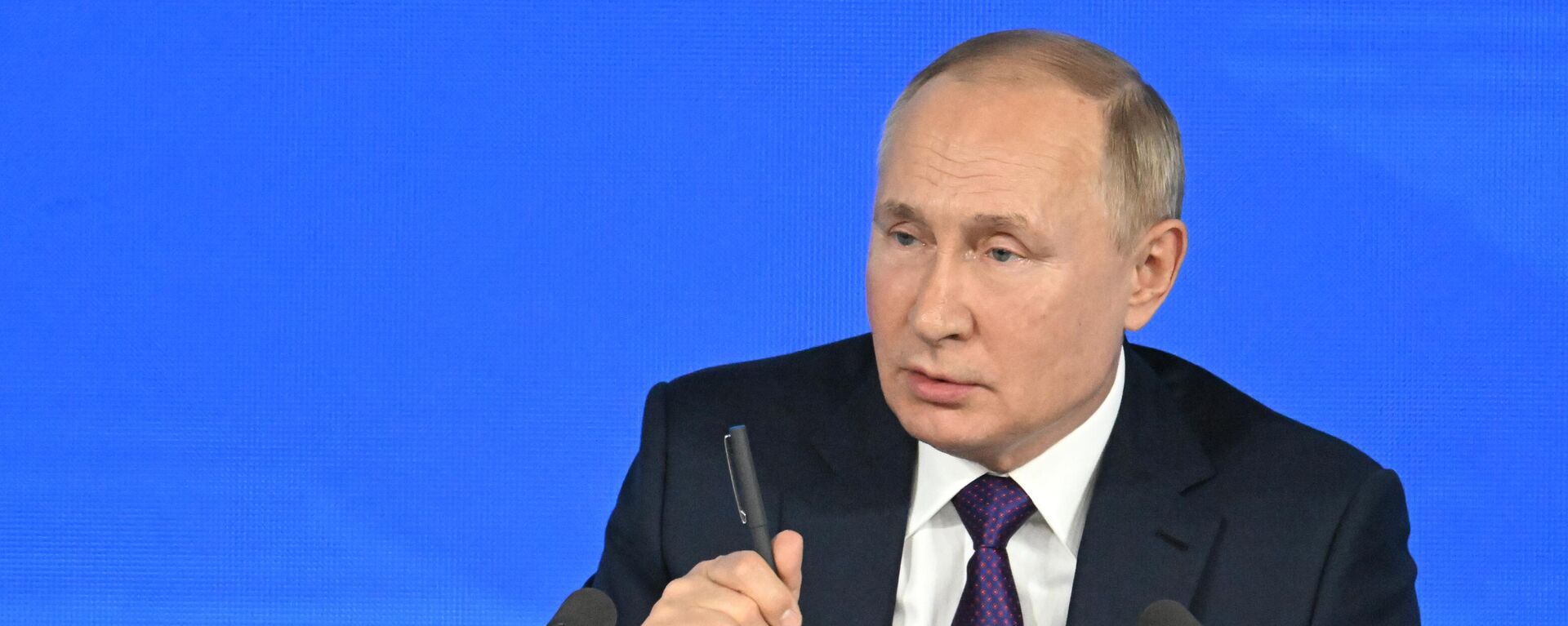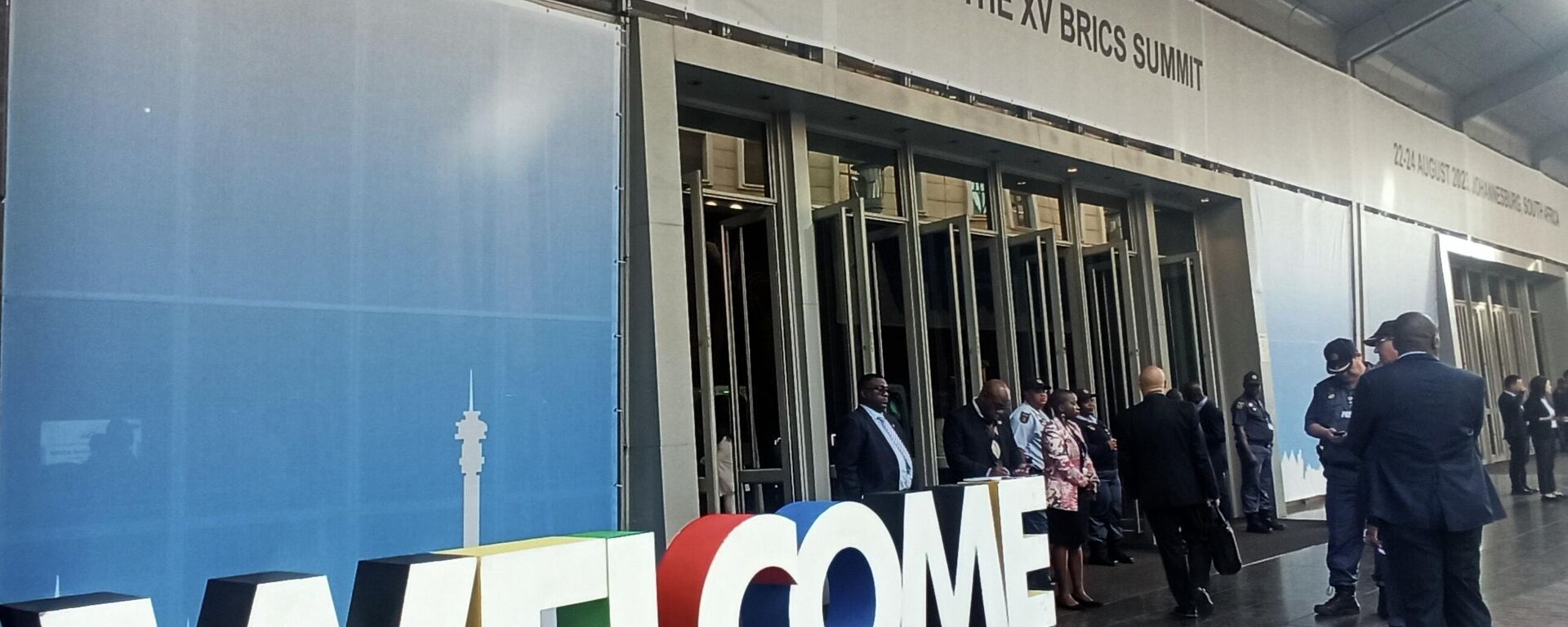https://en.sputniknews.africa/20231227/by-increasing-membership--eyeing-common-currency-brics-counterbalances-collective-west-in-2023-1064323928.html
By Increasing Membership & Eyeing Common Currency, BRICS Counterbalances Collective West in 2023
By Increasing Membership & Eyeing Common Currency, BRICS Counterbalances Collective West in 2023
Sputnik Africa
Experts examined the group's outstanding year and highlight its biggest challenges for 2024 in an interview with Sputnik. 27.12.2023, Sputnik Africa
2023-12-27T12:49+0100
2023-12-27T12:49+0100
2023-12-27T13:00+0100
brics
brazil
russia
india
new development bank (ndb)
iran
anil sooklal
egypt
ethiopia
saudi arabia
https://cdn1.img.sputniknews.africa/img/07e7/0a/0c/1062736017_0:135:2742:1677_1920x0_80_0_0_ea7b1dacd86b6b670b97b8ba3c226785.jpg
The year 2023 saw significant developments in the activities of the BRICS, a strategic cooperation comprising Brazil, Russia, India, China, and South Africa.These include the admission of new members, the election of Dilma Rousseff as a president of the New Development Bank, also known as the BRICS Bank, and progress in the discussion to develop a unified currency for the group.According to Marco Fernandes, a historian and researcher at the Tricontinental Institute, the most notable feature of the bloc during the last year has been the interest shown by more than 20 countries from the Global South in becoming members.Furthermore, Greece, not exactly a country of the Global South, was on the list of countries wishing to join the organization.Fernandes went on to say that the historic growth of the group was the second most important factor. In this context, he mentions the South African diplomat Anil Sooklal, who was designated as the Sherpa of the Johannesburg summit.Dilma Rousseff, New President of The BRICS BankThe expert also emphasized Dilma Rousseff's role as president of the BRICS Bank, stating that the appointment of the former Brazilian ambassador is an important recognition for South America."Of course, both are Bretton Woods institutions that represent, to a large extent, the interests of the Global North. This is why we need the BRICS Bank to play this role on the south side as well," the researcher remarked.One positive action taken by Dilma, according to Fernandes, was the resumption of fundraising for the BRICS Bank.The analyst went on to explain that "the equivalent of $6 billion has been raised this year" since Dilma took over the presidency of the BRICS' Bank, with $7.5 billion expected to be raised in the next few days.The Principal Aim of 2024?Fernandes' main goal for the BRICS Bank in 2024 will be to promote the discourse of de-dollarization. It turns out that the financial institution is currently collecting the majority of its resources in dollars."To give you an idea, only about $5 billion, or the equivalent, of these $33 billion was raised in yuan, the Chinese currency. The remaining amount was composed primarily of dollars and the remainder in euros. This is a problem because, precisely due to this, countries in the Global South are susceptible to fluctuations in the exchange rate and the monetary policy of the US Federal Reserve when borrowing in dollars," the researcher added.According to Fernandes, another big debate planned for the BRICS next year will be the creation of a single currency for the group, although he points out that this currency will not be something like the euro. "It's not a currency that's going to circulate, I won't have BRICS' banknotes to buy a cup of coffee in the corner," he remarked colorfully.However, the expert explained that the currency would serve "as a reference for reserves between the countries of the group, a kind of common mechanism".Russia Will Preside in 2024Brazil was due to take over the BRICS presidency in 2024. However, President Luiz Inacio Lula da Silva asked the group not to do so, as the South American nation will also be chairing the G20 in 2024, which would involve a very complex accumulation of functions. It was therefore decided to bring forward Russia's accession to the BRICS presidency.For Fernandes, this decision came at a special time, given Russia's keen interest in finding alternatives to the dollar, in a context in which Moscow, alongside Beijing, is leading the creation of a new multipolar system, away from Washington’s dictates and attentive to the needs of the Global South.Fernandes ended by lamenting the decision of the new Argentine government not to proceed with Buenos Aires' accession to the BRICS. It recalls that Brazil supported Argentina's accession to the group from the outset and made every effort to consolidate it.Who Will Be Next Year's New Members?Speaking to Sputnik, Laerte Apolinario, a professor of international relations at the Pontifical Catholic University of St. Paul (PUC-SP), said that the countries that will join the BRICS from 1 January 2024, namely Egypt, Iran, Ethiopia, Saudi Arabia and the United Arab Emirates (UAE), will bring great benefits to the group."In addition to the demographic issue, the country is located in a very strategic region. It is not only considered a point of connection in the region, due to its central position in relation to the continent, but also for its role as a link between Africa and the Middle East," he said.Apolinario also highlighted the economic theme, saying that Addis Ababa "has shown high growth rates in recent years, well above the average in emerging economies. The country has emerged by attracting labor-intensive industries, the textile industry in particularly."Another important accession, according to the professor, is that of Iran, a country that has been punished by the Western powers, led by the US, simply for not submitting to their geopolitical and economic impositions.The specialist also highlighted the entry of the UAE into the group, pointing out that this Middle Eastern country is "one of the largest producers of oil and natural gas in the world, and is a major exporter of oil.""We are talking about a country that is already part of the BRICS' Bank, so it has already participated in BRICS mechanisms over recent years. And the contribution of the UAE would be, precisely that, a country that can inject both liquidity for the bank, but also have a more significant role in the international financial system," he illustrated.
https://en.sputniknews.africa/20231214/russias-work-under-its-brics-presidency-to-be-dedicated-to-fair-world-order-1064115320.html
https://en.sputniknews.africa/20231222/new-chapter-of-prosperity-ethiopian-minister-talks-benefits-from-brics-membership-1064251609.html
brazil
russia
india
iran
egypt
ethiopia
saudi arabia
united arab emirates (uae)
argentina
china
south africa
Sputnik Africa
feedback@sputniknews.com
+74956456601
MIA „Rossiya Segodnya“
2023
Sputnik Africa
feedback@sputniknews.com
+74956456601
MIA „Rossiya Segodnya“
News
en_EN
Sputnik Africa
feedback@sputniknews.com
+74956456601
MIA „Rossiya Segodnya“
Sputnik Africa
feedback@sputniknews.com
+74956456601
MIA „Rossiya Segodnya“
brics, brazil, russia, india, new development bank (ndb), iran, anil sooklal, egypt, ethiopia, saudi arabia, united arab emirates (uae), argentina, china, south africa, brics expansion, economy, politics, diplomacy, international, sputnik
brics, brazil, russia, india, new development bank (ndb), iran, anil sooklal, egypt, ethiopia, saudi arabia, united arab emirates (uae), argentina, china, south africa, brics expansion, economy, politics, diplomacy, international, sputnik
The year 2023 saw significant developments in the activities of the BRICS, a strategic cooperation comprising Brazil, Russia, India, China, and South
Africa.
These include the admission of new members, the election of Dilma Rousseff as a president of the
New Development Bank, also known as the BRICS Bank, and progress in the discussion to develop a unified currency for the group.
According to Marco Fernandes, a historian and researcher at the Tricontinental Institute, the most notable feature of the bloc during the last year has been the interest shown by more than 20 countries from the Global South in becoming members.
"There has never been a global movement comparable to that of the BRICS," he said.
Furthermore, Greece, not exactly a country of the Global South, was on the list of countries wishing to join the organization.
"We even saw French President [Emmanuel] Macron request to participate in the last BRICS meeting, which was obviously vetoed," the expert recalled.
Fernandes went on to say that the historic growth of the group was the second most important factor. In this context, he mentions the South African diplomat Anil Sooklal, who was designated as the Sherpa of the Johannesburg summit.
"Imagine the work that the South African sherpas had to do this year to undertake all this coordination, interact with more than 20 countries that were applying, and then to carry out the entire process of selecting the six new countries."
Dilma Rousseff, New President of The BRICS Bank
The expert also emphasized Dilma Rousseff's role as president of the
BRICS Bank, stating that the appointment of the former Brazilian ambassador is an important recognition for South America.
"Having a Brazilian world leader in such an important position clearly gives political capital to Brazil, gives political Capital to South America and, above all, to President Lula, who was the one who made this decision," said the expert.
"The BRICS Bank, like the World Bank, needs to guide public discourse on the world's major strategic issues. How many times do we open the newspaper and read: 'According to the World Bank's findings, next year's inflation will be...'? The same with the IMF [International Monetary Fund]," he stated.
"Of course, both are Bretton Woods institutions that represent, to a large extent, the interests of the Global North. This is why we need the BRICS Bank to play this role on the south side as well," the researcher remarked.
One positive action taken by Dilma, according to Fernandes, was the resumption of fundraising for the BRICS Bank.
"Prior to Dilma's arrival, the bank had been depleted of funding for over a year. Furthermore, a bank with inadequate funding is incapable of accomplishing a whole lot. This will guarantee optimal financial support for infrastructure initiatives in the developing world," he said.
The analyst went on to explain that "the equivalent of $6 billion has been raised this year" since Dilma took over the presidency of the BRICS' Bank, with $7.5 billion expected to be raised in the next few days.
"Taking into account the fact that the bank has amassed the equivalent of $33 billion over the past eight years, this equates to an annual average of approximately $4 billion. If they reach $7.5 billion by the end of the year, the bank will have acquired nearly twice as much funding on average," Fernandes noted.
The Principal Aim of 2024?
Fernandes' main goal for the BRICS Bank in 2024 will be to promote the discourse of
de-dollarization. It turns out that the financial institution is currently collecting the majority of its resources in dollars.
"To give you an idea, only about $5 billion, or the equivalent, of these $33 billion was raised in yuan, the Chinese currency. The remaining amount was composed primarily of dollars and the remainder in euros. This is a problem because, precisely due to this, countries in the Global South are susceptible to fluctuations in the exchange rate and the monetary policy of the US Federal Reserve when borrowing in dollars," the researcher added.
"The BRICS bank needs to raise money in local currencies. That is the goal for 2026 — raise up to 30% in local currencies. So the bank will have to make a lot of progress on this in the coming years," he explained.
According to Fernandes, another big debate planned for the BRICS next year will be the creation of a single currency for the group, although he points out that this
currency will not be something like the euro. "It's not a currency that's going to circulate, I won't have BRICS' banknotes to buy a cup of coffee in the corner," he remarked colorfully.
However, the expert explained that the currency would serve "as a reference for reserves between the countries of the group, a kind of common mechanism".
Russia Will Preside in 2024
Brazil was due to take over the BRICS presidency in 2024. However, President Luiz Inacio
Lula da Silva asked the group not to do so, as the South American nation will also be chairing the G20 in 2024, which would involve a very complex accumulation of functions. It was therefore decided to bring forward Russia's accession to the BRICS presidency.
For Fernandes, this decision came at a special time, given Russia's keen interest in finding alternatives to the dollar, in a context in which Moscow, alongside Beijing, is leading the creation of a new multipolar system, away from Washington’s dictates and attentive to the needs of the Global South.
"I think nothing could have been better for the BRICS, in a year of consolidating expansion and advance in discussions on alternatives to the dollar, that Russia took over the presidency at this time," he said.
Fernandes ended by lamenting the decision of the new Argentine government not to proceed with Buenos Aires' accession to the BRICS. It recalls that Brazil supported
Argentina's accession to the group from the outset and made every effort to consolidate it.
"If Argentina does not enter, what I heard from internal BRICS sources is that there will be no immediate replacement. That would be very bad, because Latin America will lose a place that was won with a lot of diplomatic work," the scholar pondered.
Who Will Be Next Year's New Members?
Speaking to Sputnik, Laerte Apolinario, a professor of international relations at the Pontifical Catholic University of St. Paul (PUC-SP), said that the countries that will join the BRICS from 1 January 2024, namely Egypt, Iran,
Ethiopia, Saudi Arabia and the United Arab Emirates (UAE), will bring great benefits to the group.
"When we look at Ethiopia, for example, we are talking about the second most populous country in Africa, with a population of more than 120 million. And it is a population composed mainly of young people, which means that the country has good prospects of growth in the future, especially in terms of the demographic dividend," he assessed.
"In addition to the demographic issue, the country is located in a very strategic region. It is not only considered a point of connection in the region, due to its central position in relation to the continent, but also for its role as a link between Africa and the Middle East," he said.
Apolinario also highlighted the economic theme, saying that Addis Ababa "has shown high growth rates in recent years, well above the average in emerging
economies. The country has emerged by attracting labor-intensive industries, the textile industry in particularly."
Another important accession, according to the professor, is that of
Iran, a country that has been punished by the Western powers, led by the US, simply for not submitting to their geopolitical and economic impositions.
"In recent decades, Iran has been blank of numerous sanctions by the United States and also by other Western countries seeking to put pressure on Tehran. Therefore, Iran has sought to diversify its international policy and its alliances, as a way to combat this political isolation in the international system," the internationalist pointed out. "We note that in recent years Iran has tried to get closer especially to China, which is today its largest trading partner, representing more than half of its exports, a third of its imports, in addition to other countries, such as India and Russia."
The specialist also highlighted the entry of the
UAE into the group, pointing out that this Middle Eastern country is "one of the largest producers of oil and natural gas in the world, and is a major exporter of oil."
"We are talking about a country that is already part of the BRICS' Bank, so it has already participated in BRICS mechanisms over recent years. And the contribution of the UAE would be, precisely that, a country that can inject both liquidity for the bank, but also have a more significant role in the international financial system," he illustrated.



